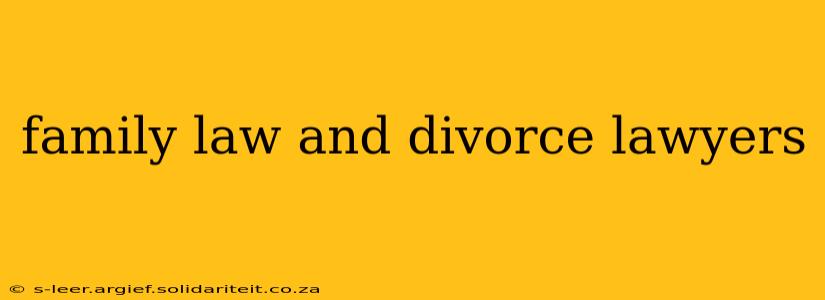Divorce and family law are intricate areas of legal practice, demanding expertise and sensitivity to navigate the emotional and logistical challenges involved. Choosing the right family law and divorce lawyer is crucial for a positive outcome. This comprehensive guide explores the critical aspects of finding effective legal representation during this challenging time.
What Does a Family Law and Divorce Lawyer Do?
Family law and divorce lawyers specialize in resolving legal matters related to family structures, including divorce, child custody, child support, spousal support (alimony), property division, and domestic violence. They act as advocates for their clients, protecting their rights and interests throughout the legal process. Their duties encompass a wide range, from negotiation and mediation to litigation in court.
How to Find the Right Family Law and Divorce Lawyer for Your Needs?
Selecting a lawyer is a significant decision. Consider the following factors:
- Experience: Look for lawyers with a proven track record in family law. Years of experience often translate to a deeper understanding of legal intricacies and effective negotiation strategies.
- Specialization: Some lawyers specialize in specific areas of family law, such as high-net-worth divorce or complex custody battles. Identify a lawyer whose expertise aligns with your specific circumstances.
- Communication Style: Effective communication is paramount. Choose a lawyer you feel comfortable with and who communicates clearly and concisely. Regular updates and responsiveness are crucial.
- Fees: Understand the lawyer's fee structure upfront. This could involve hourly rates, flat fees, or contingency fees. Transparency regarding costs is essential.
- Reviews and Referrals: Check online reviews and seek referrals from trusted sources. Client testimonials offer valuable insights into a lawyer's professionalism and effectiveness.
What are the Different Types of Family Law Cases?
Family law encompasses a broad spectrum of legal issues, including:
- Divorce: The legal dissolution of a marriage, including the division of assets, debts, and determination of child custody and support.
- Child Custody: Legal and physical custody arrangements for children, determining which parent has decision-making authority and where the child resides.
- Child Support: Financial support provided by one parent to the other for the care and well-being of their children.
- Spousal Support (Alimony): Financial support provided by one spouse to the other after separation or divorce.
- Property Division: Fair and equitable distribution of marital assets and debts during divorce proceedings.
- Domestic Violence: Legal protection orders and representation for victims of domestic abuse.
- Adoption: Legal proceedings to establish parental rights and responsibilities for adopted children.
- Paternity: Establishing legal parentage for children born out of wedlock.
- Prenuptial Agreements: Legal contracts that define the financial arrangements between spouses in the event of divorce.
What Questions Should I Ask a Potential Family Law and Divorce Lawyer?
Preparing thoughtful questions will help you assess a lawyer's suitability. Consider asking about:
- Their experience with cases similar to yours.
- Their approach to negotiation and litigation.
- Their fee structure and payment options.
- Their communication style and frequency of updates.
- Their availability and responsiveness.
- Their success rate in cases similar to yours (while respecting client confidentiality).
How Much Does a Family Law and Divorce Lawyer Cost?
The cost of hiring a family law and divorce lawyer varies significantly depending on several factors: the complexity of the case, the lawyer's experience and reputation, the location, and the services required. Hourly rates, flat fees, and contingency fees are common fee structures. It is essential to discuss fees openly and obtain a clear understanding of all potential costs before engaging a lawyer.
How Long Does a Family Law Case Take?
The duration of a family law case depends on multiple factors, including the complexity of the issues, the cooperation between parties, and the court's caseload. Simple, uncontested divorces might be resolved quickly, while complex cases involving significant assets or contentious custody battles can take considerably longer.
What is the Role of Mediation in Family Law Cases?
Mediation is a valuable alternative dispute resolution method in family law. It involves a neutral third party who facilitates communication and negotiation between the parties to reach a mutually agreeable settlement. Mediation can significantly reduce conflict, save time and costs, and often leads to more collaborative outcomes.
This guide offers a solid foundation for understanding family law and the process of selecting a lawyer. Remember, seeking legal counsel is a critical step in navigating the complexities of divorce and family matters. Take your time, do your research, and choose a lawyer you trust to advocate effectively for your interests.
